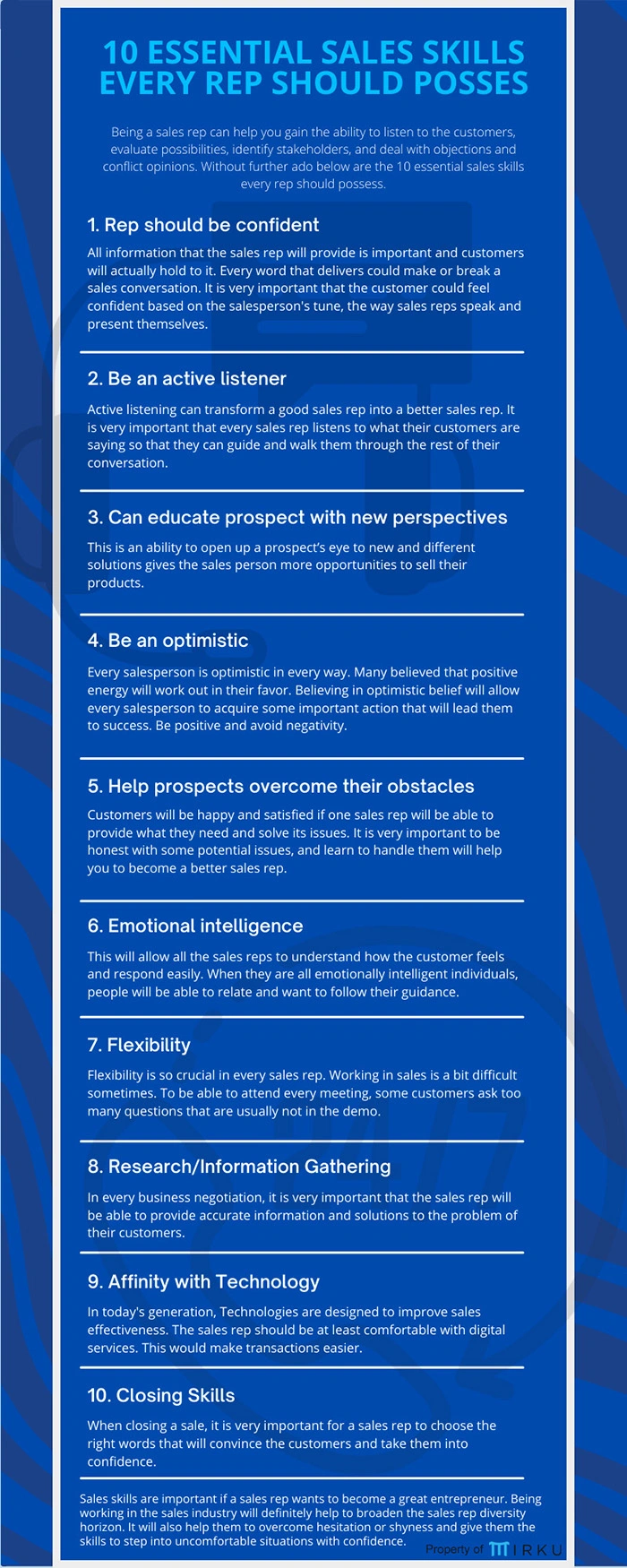These are the sales skills every salesperson should possess.
If you have been working in sales for over a year, chances are you fit this description. If you’re reading through this opening paragraph, eyes peeled for what comes next, then you’re in the thick of denial.
Admittedly, the description is a bit harsh and has probably never been particularly true for a few good salespeople. But we’ve all met that stereotype one too many times on occasion, luckily at least a few and far between the great ones. The one-dimensional method man that often costs the sale, even when the product is an easy sell.
As sure as the sun rises in the east, the world will continue to turn and fundamentally bring on change. Talking a lot, flexing the truth, and killing for a sale regardless of the prospect’s needs and requirements, simply isn’t how the sales game is played.
Not anymore and never again.
Welcome to the modern world of sales and marketing. Powered by cutting-edge technology, seeded by top-notch software and user-friendly programming, we are now living in the future.
Always a cutthroat industry, being in sales only means arming yourself with the most important sales skills to stay ahead of the competition. Whether you are a sales manager or a sales team member, you need to prioritize adopting important sales skills as part of regular training.
Since customer demands and the market are ever-evolving, having the best practices and key messages reinforced to your team, including your experienced salespeople, is crucial in ensuring that they are well-rounded all throughout the sales process.
There is a new information dynamic that demands much more specific sales skills, and a new type of sales personality: The salesperson who can draw on their complex knowledge to help solve a prospect’s specific issue is who the market requires, not just someone who’s simply an expert at selling.
Keep yourself attuned and in check with these key salesperson skill set essentials.
Strong At The Core: Mastering The Basics
The core strategy of targeted marketing relies on the strength of the skill set that most salespeople possess. The ability to adapt to effective sales readiness is a strategy that is essential to success. With training and coaching to support the development of critical sales skills, organizations can equip even the inexperienced salesperson to close more and bigger deals.
Effective Communication Skills
Strong communication skills are the foundation of building meaningful relationships with clients, setting expectations, and discussing a buyer’s pain points. Effective communication, both written and verbal, is a fundamental skill that salespeople need to persuade prospects or potential customers into buying a product or service. It is important to remember how communication is about much more than just speaking clearly and concisely. Salespeople also need to understand that tone and manner of delivery also matter.
Storytelling is a means of effective communication. Telling a story that empathically connects you to a client or a prospect allows the salesperson to tap into a persona that allows selling to be engaging and authentic. By presenting a product or a service into a story arc that will address the relevant pain points and needs of the customer, the salesperson opens a gateway of possibilities that may often lead to closing a deal or even better, building better relationships.
Keeping your writing and presentation abilities sharpened will be a big plus when interacting over email, social media, video conference, or in-person. Collaboration plays a major role in sales and marketing and to be able to communicate effectively throughout the sales cycle, from cold outreach and follow-up, to recognizing an opportunity is an essential skill that needs mastery.
Sales is an agile industry where you can further hone your communication skills efficiently and reinforce these concepts through training, peer learning, and team discussions. These are the avenues to exercise communication skills and collaboration.
Relationship Building Skills
Salespeople need good listening skills to connect with clients, yet in today’s fast-paced business world, the temptation to formulate an instant response or follow-up question is too strong. The pitfall of not being able to listen to your customer or clients’ needs is deep and wide. It is a point of no return. Right before you lose the opportunity, always be reminded that active listening is all about staying in the moment and a key factor in relationship building.
Relationship building is when a salesperson finds mutual, non-business-related interests with a customer to build rapport instead of immediately talking their ears off about the product or service details. The 2017 State of Sales Survey by LinkedIn states that trust in the salesperson is the number.1 contributing factor in a purchase decision of a buyer. This only proves that when the buyer clearly understands what the seller is saying a sales milestone is actually met.
The goal of relationship-building is simply to build trust with your customer. When successfully built, having a strong relationship with their customer also means that they will come to them for advice about specific pain points, as opposed to consulting with a competitor. This will make the relationship more genuine and help the salesperson establish credibility.
Talking to customers about non-work-related topics may seem like a meaningless exercise but knowing what’s important to the customer on a practical and emotional level has its rewards. Positioning yourself as a consultative salesperson requires a connection on a human level. This helps to grow rapport and foster trust and eventually, in time, these conversations will elevate into a business relationship.
Adaptability Skills
Modern sales skills require the salesperson to adapt to the current needs of the market and enable themselves to be “future-proofed”. Knowing your prospects’ pain points as well as know the product or service you are selling entails proper training. It is not easy to tailor sales skills unique to every client, but with technology and a genuine interest in developing the knowledge, you are well on your way to mastering the skill set essentials you need.
Present-day sales skills demand spending more time researching prospects and learning about the market than other traditional sales techniques. This can shape every interaction you have with a prospect from the first contact and nurturing, to your sales pitch and closing the deal.
CRM software allows you to gather insights on sales prospects you never would have had access to in the past. By taking advantage of these new tools, small businesses can understand and therefore sell to customers better with a more tailored and personal approach.
Learning how to take advantage of various sales tools, whether it’s conventional marketing, mastering the use of your CRM, or a sales readiness platform, using new technologies has quickly become a standard for salespeople, and the trend isn’t going away anytime soon.
Excellence is not a skill, but an attitude.
The past year has spelled out a recent economic crisis that has changed the way customers spend money and what has been bought or sold in a highly volatile marketplace. Be that as it may, salespersons need not focus on threats because, with the latest technology trends, the landscape of sales and marketing is always evergreen.
Excellence is never far behind. All you need to do is master the essentials, the Mirku way.

